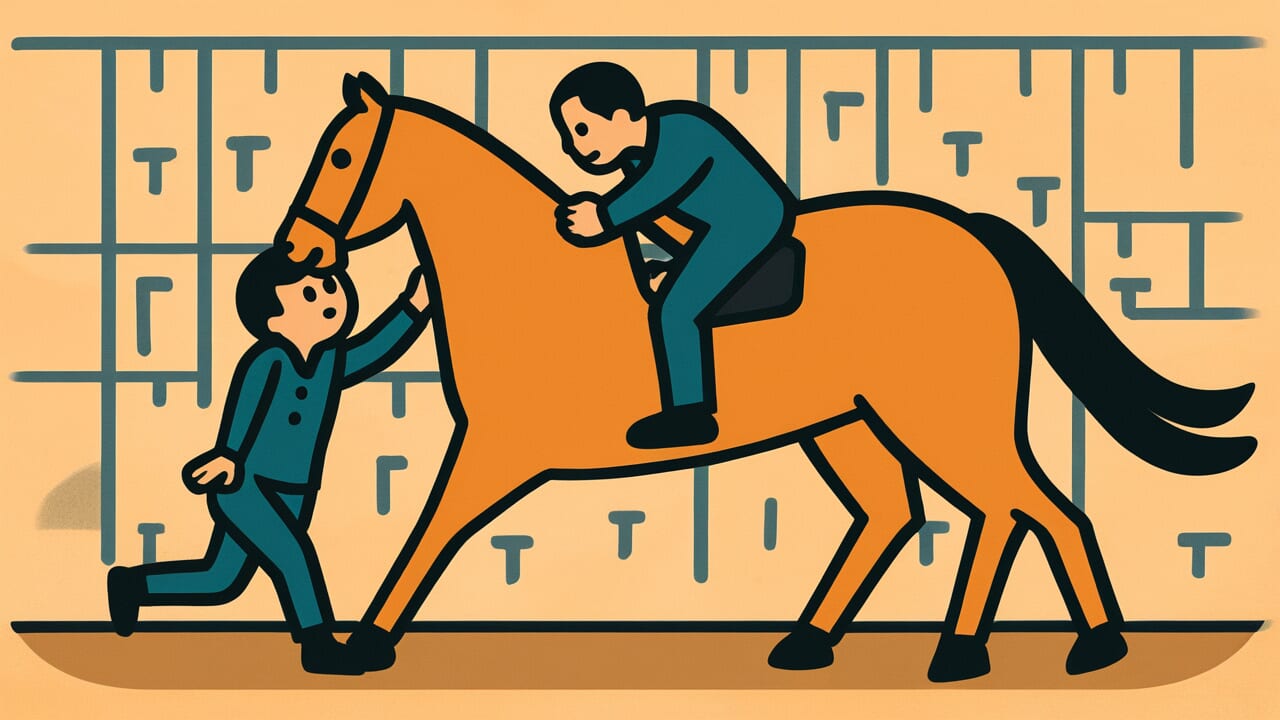How to Read “Riding a horse onto a wall”
Kabe ni uma wo norikakeru
Meaning of “Riding a horse onto a wall”
“Riding a horse onto a wall” is a proverb that warns against meaningless showing off and empty fuss.
It comes from the image of trying to lean a horse against a wall, which is impossible and pointless.
This proverb is used for people who act flashy without real ability or results.
It criticizes those who try to make empty actions look impressive.
Trying to ride a horse onto a wall is impossible and wastes effort.
Similarly, decorating only the outside when there’s no real value is foolish.
Even today, people use this proverb in certain situations.
It applies when someone loudly promotes themselves without real achievements.
It also fits when someone tries to impress others with only superficial actions.
The proverb teaches that true ability and sincerity matter most.
Surface-level showing off ultimately means nothing.
Origin and Etymology
No clear written records explain the origin of this proverb.
However, the structure of the phrase offers interesting insights.
The expression “Riding a horse onto a wall” deliberately describes something physically impossible.
This makes the meaninglessness of the action stand out clearly.
A wall is a vertical obstacle that blocks your way.
You absolutely cannot ride a horse onto it.
When you imagine someone trying anyway, the absurdity and waste become obvious.
This expression likely emerged from Edo period samurai culture.
That society placed great importance on appearances and reputation.
People would try to make themselves look bigger than they really were.
They would exaggerate things they couldn’t actually do.
The proverb compares this behavior to the impossible act of riding a horse onto a wall.
The word “norikakeru” is particularly important in this phrase.
It doesn’t mean fully mounting something.
Instead, it suggests forcefully trying to lean something against a wall.
You can picture the recklessness and certain failure of this action.
The proverb warns against actions that produce no results.
It criticizes just making noise without substance.
This wisdom has been passed down through generations as a valuable lesson.
Usage Examples
- The new product launch was flashy but had no substance, like riding a horse onto a wall
- His boasting has no real achievements behind it, just empty noise like riding a horse onto a wall
Universal Wisdom
“Riding a horse onto a wall” offers deep insight into a universal human trait: vanity.
Why do people try to make themselves look bigger than they are?
It’s because the desire for recognition runs deep in human nature.
We all want to prove our worth to others.
This proverb has survived through the ages for good reason.
In every era and every society, people have tried to decorate themselves with empty displays.
People want to hide their weaknesses.
They act flashy to cover up their insecurities.
The reckless act of riding a horse onto a wall perfectly symbolizes this psychology.
What’s interesting is that this proverb doesn’t just criticize.
It also contains gentleness in its warning.
You can feel the compassion of our ancestors in these words.
They knew that meaningless showing off ultimately hurts the person doing it.
That’s why they urge us to value what’s real.
Everyone has a desire to be recognized.
But true value doesn’t come from flashy appearances.
It comes from steady effort and sincerity.
This proverb quietly but powerfully speaks this truth.
When AI Hears This
Consider the physics of a horse running toward a wall.
The combined mass of horse and rider is about 600 kilograms.
At 30 kilometers per hour (about 8 meters per second), the kinetic energy equals roughly 20,000 joules.
This is similar to a small car moving at low speed.
But what happens to this energy when hitting the wall?
According to the law of energy conservation, energy never disappears.
However, the forward motion with purpose is completely lost.
The energy transforms into impact sounds, wall vibrations, heat inside the horse’s body, and shock waves into the ground.
Energy that was focused in one direction scatters in all directions.
This perfectly demonstrates the second law of thermodynamics.
It’s the principle of entropy increase.
Ordered energy always moves toward disorder.
The energy that could have been used to cross the wall becomes zero.
Everything dissipates uselessly.
If you want to cross the wall, you must change the direction of energy.
For example, running up a ramp converts kinetic energy into potential energy.
This lets you gain height.
With the same amount of energy, the direction of the vector changes everything.
The physical truth is clear: direction matters more than quantity of effort.
Lessons for Today
This proverb teaches you something especially important in the social media age.
It’s about valuing what’s real.
Are you obsessed with likes, followers, and flashy posts to get attention?
Self-expression is important, of course.
But showing off without substance only creates emptiness.
Modern society makes it easier to fake success.
But at the same time, people have developed sharper eyes for spotting what’s real.
Stretching yourself too far, like riding a horse onto a wall, will eventually be seen through.
What matters is steadily building real ability.
What matters is walking with sincerity.
Even without flashiness, you can take solid steps forward.
In the long run, this attitude builds the strongest trust.
Your value isn’t determined by how loud you can shout.
It’s determined by how sincerely you live.
Don’t be distracted by meaningless showing off.
Treasure your own authentic path.
That’s the warm message this proverb offers to you today.



Comments